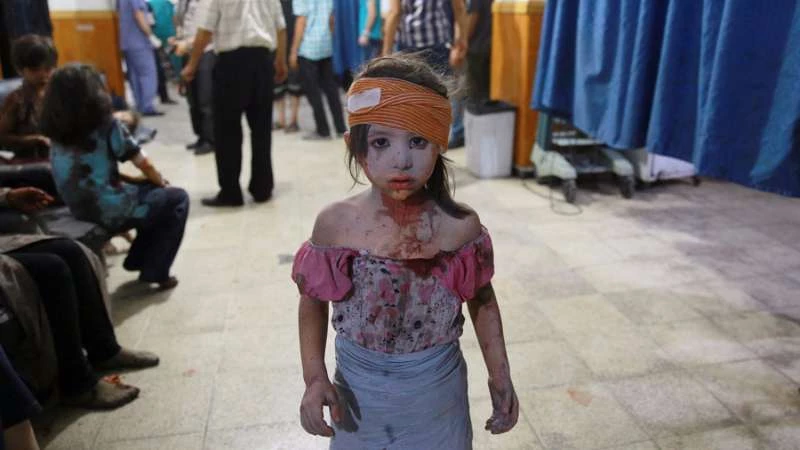In a joint letter to President Obama this month, fifteen doctors described the infants’ deaths: “Gasping for air, their lives ended before they had really begun.” The doctors are among the last few in the eastern part of Aleppo, the historic former commercial center where a hundred thousand children are now trapped.
“Young children are sometimes brought into our emergency rooms so badly injured that we have to prioritize those with better chances, or simply don’t have the equipment to help them,” the doctors wrote.
Only a trickle of food is making it through a land blockade imposed by the regime of Assad. “Whether we live or die seems to be dependent on the ebbs and flows of the battlefield,” the doctors said. “For five years, we have faced death from above”—bombs—“on a daily basis. But we now face death from all around.”
More than a third of all casualties in Aleppo are now kids, according to Save the Children. Among them is Omran Daqneesh, the toddler with the moppish Beatles haircut whose picture captivated the world this week. On Saturday, we learned that Omran’s older brother Ali, who was ten, had died from wounds sustained in the attack.
In June, Osama Abo El Ezz, a general surgeon in Aleppo, described a rocket attack on an infant-care ward. “Nine newborns were rushed to the basement of the hospital for safety, their incubators destroyed,” he wrote. “I have been a practicing physician in Aleppo City since 2012 and I am still in awe of the magic of bringing a baby into the world. There is nothing like it—those first breaths, those first cries. The look in a mother’s eyes, having labored to bring this small person into the world. It should be a moment of peace, gratitude and quiet joy—but in Syria today, giving birth is a nightmare.”
On July 23rd, eleven babies were being kept alive in incubators when a regime airstrike hit Children’s Hospital, in Aleppo. A second round hit the next day. Three infants died from lack of oxygen and dust inhalation, CNN reported.
Ground and air assaults against hospitals have escalated this summer, a trend too common to be considered anything but deliberate. The letter from fifteen Syrian doctors reported forty-two airstrikes on medical facilities in Aleppo in July alone.
The existential plight of Syria’s kids is the worst in the world. “Some 3.7 million Syrian children under the age of five have known nothing but displacement, violence, and uncertainty,” the unicef spokesman Chris Tidey told The New Yorker on Friday. They have all been born since a popular uprising disintegrated into a civil war in 2011. “The numbers are incredible,” Tidey said. “And unparalleled.”
Altogether, well over eight million kids—more than a third of the population, in a country that had twenty-two million people when the conflict erupted—now depend on humanitarian assistance to survive the day. Roughly 2.5 million children have fled Syria altogether, unicef reports.
As the Pokéman Go craze swept the West last month, the Revolutionary Forces of Syria Media Office sought to mobilize world attention by distributing pictures of Syrian tots holding up pictures of Pikachu, done in crayon, with the caption “Come save me.”
The plight of these kids reflects the dangers to a postwar future in one of the most strategic countries in the Middle East. A whole generation is being lost, two U.N. agencies told The New Yorker. Almost three million kids—the equivalent of all the school-age children in New York City, Los Angeles, and Dallas combined—are not in school.
This summer, the children of Aleppo have become even more vulnerable, because they no longer have access to safe drinking water, Tidey said.
Children have also been among the purported victims of chlorine gas used by the regime this month. Staffan de Mistura, the U.N. special envoy for Syria, told reporters in Geneva that “there is a lot of evidence” that chlorine gas was dropped on eastern Aleppo. De Mistura added, “If it did take place, it is a war crime.”
For Syria’s kids, fleeing the fighting is no guarantee of survival. The other image that captured Syria’s lost generation was the picture, last September, of Aylan Kurdi, a child whose lifeless body washed up on a beach in Turkey after the family escaped Syria. Relief agencies don’t have exact numbers, but hundreds of Syrian children are believed to have drowned in the Mediterranean when their overcrowded boats capsized.
On Thursday, two girls—one five years old, the other eight months—drowned in the Mediterranean when their small wooden boat capsized and sank off the coast of Libya. The body of a five-year-old boy travelling with them was not recovered.



التعليقات (0)